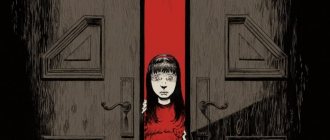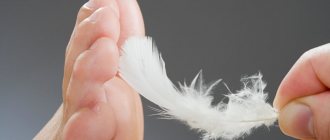It would seem, what’s wrong with it when a person twirls his hair
? But in fact, in most cases, this harmless action, especially when performed by an adult, is not at all harmless. No one can say for sure why and why we like to “tangle”, so to speak, our curls. This problem especially concerns women, perhaps because they really have something to twirl on their heads, but also, in my life, there were also men who unintentionally twirled real whirlwinds on their heads, doing it so often that bald patches appeared.
This question began to bother me when I noticed this bad habit in my son. This happened completely unconsciously, and over time I even managed to understand what exactly made him want to spin another whirlwind. In those moments when Nikita was embarrassed, worried or lying, he began to brutally twirl his thick, wire-like hair around his finger. After carefully studying the information on the Internet, I realized that these actions could develop into a serious bad habit and began to wean him off it.
To begin with, I convinced my child that this habit leads to his hair starting to stick out in different directions.
, especially bangs, and this is very ugly. At that time, he liked his classmate Nastya, and I had to constantly remind him that in order for the sympathy to be mutual, he must be a neatly combed boy. This was enough for a while, and I began to notice that Nikita was twisting his hair much less often, but then the habit returned again. My husband and I began to constantly make comments to him, but as soon as the child was alone in the room, he again began to “twist his curls.” The only more or less effective measure in this situation could be a very short haircut, but the son categorically did not agree to such a radical measure, for the thousandth time, promising that he would not do anything else.
Time passed, the child grew up, and with him the habit grew up. Now Nikita himself didn’t like the fact that his hair grew in different directions, and he began to devote a lot of time to his hairstyle, styling his bangs for half an hour every morning. But this didn’t help either, because at the first excitement, just as adults grab a cigarette, a bottle, or bite their fingernails, my son began to twirl his rather short hairs around his fingers. In the end, we still managed to convince him to get a short hairstyle, at least for a while, until he learns to calm himself down with something else.
In short, only six months later, I was able to breathe more or less calmly. My son stopped “curling” his head and no longer wrapped his hair around his fingers, but now I have another problem. If earlier, thanks to his bad habit, I immediately understood that he was lying or worried, but now it is no longer so simple. Moreover, maybe because of this, or maybe not, he has developed a new bad habit - lying, with or without reason... And now, I will have to wean him from lying. And I don’t even know... Maybe we shouldn’t have taught him not to twirl his hair?
Do you constantly stomp your feet, twirl your hair on your finger, blink frequently, shake your head, bite your nails, crack your knuckles, pick at skin, bite and lick your lips, shrug your shoulders, or touch your chin? It's time to get rid of these habits, because some of them can harm you.
How do nervous habits appear and what are they?
Research into these behaviors tends to focus only on the severe stages of these habits. They are signs of neurobehavioral disorders such as autism and Tourette syndrome.
Every person has at least one obsessive habit. Some people have no idea about its existence.
Scientists divide nervous habits into three groups:
- Standard repetitive actions, which consist of rapid movements of various parts of the body, coughing, sniffing. In this case, the person feels a real need to perform the action.
- Stereotyping is the unconscious repetition of movements, such as swaying the body from side to side, tapping fingers, or twitching legs.
- Obsessive behavior leading to self-harm. This group includes the habit of tearing off skin and pulling out hair.
“All compulsions originate in the basal ganglia, an area of the brain that controls motor function,” says Ali Mattu, a clinical psychologist at Columbia University Medical Center who specializes in compulsions that lead to self-harm.
In a stressful or unfamiliar situation, the basal ganglia select basic movements, remember them and form a habit.
Because of this, we can react in the same way to similar situations and perform certain actions automatically.
Most nervous habits are formed in childhood. With the exception of children with autism, many outgrow habits such as grimacing or head shaking. This happens because as we age we begin to become aware of our behavior, emotions and feelings.
However, a person can simply adapt his habit to the adult world and learn to hide it. For example, the need to open your mouth wide or bite your lips may lead to an addiction to chewing gum.
Unbalanced diet
For normal growth, hair needs a balance of various vitamins and microelements. The lack of essential amino acids, zinc, iron, and proteins greatly affects hair health. For example, Korean researchers concluded in 2013 that premenopausal women are more likely to experience hair loss due to iron deficiency.
For beautiful hair, you must adhere to a healthy and well-balanced diet, be sure to include foods containing protein, vitamin E, selenium, copper, zinc, iron and other beneficial microelements in your diet. This condition must not be forgotten when choosing.
How to deal with nervous habits
Most people do not try to get rid of nervous habits and do not see anything wrong with them. Help is required when behavior interferes with normal life and communication with other people. Shaking your neck can lead to problems with the spine, tearing off skin can lead to scars, and nervously clicking your pen can lead to losing your dream job even at the interview stage.
Doug Woods, a professor of psychology at Marquette University, studies compulsive behaviors and helps combat them. He argues that many patients perceive nervous habits as a reward, a temporary distraction or relief. In other words, they find satisfaction in the fact that they can allow themselves to click their teeth or knuckles.
A person can stop performing a particular action if asked to do so or if negative consequences are pointed out. You can get rid of some nervous habits on your own.
Severe cases require medical intervention. If obsessive habits are not a side effect of drugs or medications, the doctor first helps the patient recognize that he has a health problem. He asks the patient to describe in great detail, including emotions and thoughts.
In the fight against nervous habits, it is important to understand in what cases they manifest themselves. You need to find out why it makes a person nervous and try to correct your attitude towards such situations.
In addition, doctors also often practice developing the opposite habits. Together with the patient, they select a more acceptable action that suppresses the nervous habit. For example, squeezing a ball instead of clicking your knuckles.
Scientists agree that any obsessive habit signals human emotions such as fear, irritation, boredom, sadness, excitement, tension. It is recognition of this signal that will help cope with the problem.
Psychological problems that bother people usually influence the emergence of bad habits. Conventionally, our addictions can be divided into groups depending on what emotions they are caused by.
G.N. talks about what bad habits indicate and how to deal with them. Tikhomirova, psychologist, psychoanalyst at the Center for Psychoanalytic Research of the Creative Process.
"Anxious" habits
The habit of constantly fiddling with something in your hands (a pen, clothes, jewelry), repeating the same meaningless actions (tapping your fingers on the table, scratching yourself, adjusting your glasses, touching the tip of your nose, rocking on a chair), putting something in your mouth (finger, nail, cigarette), as well as emptying the refrigerator every night indicates that something is bothering you. You try to get rid of this anxiety by doing certain things. And the higher the level of anxiety, the more your nails or pen will be bitten, the more often you will look into the refrigerator and eat too much before going to bed. If a person has a high level of anxiety and feels anxious even when alone with himself, then this habit will manifest itself constantly - he will constantly pull his finger (nails, cigarette) into his mouth. If anxiety manifests itself in certain situations, then, accordingly, the bad habit will manifest itself only when he is in a state of anxiety, for example, during negotiations, during a conversation with his superiors, when he thinks about something unpleasant for him . The roots and causes of anxiety can lie in a variety of areas, so it is often quite difficult to find them without the help of a specialist. The habit of self-soothing in one way or another is often reinforced in childhood. The baby has a sucking reflex, and even if he is full, he will still suck his finger or pacifier because the reflex requires satisfaction. And this action will calm him down. It’s the same for adults: they remember what calmed them in childhood, and begin to suck on something in situations that disturb them. Therefore, first figure out why exactly in difficult situations (or constantly) you have such a reaction, which causes you to have a surge of anxiety. Only by identifying the reason can you break the bad habit.
The most harmful of the “anxious”
Research shows that many people reach for a cigarette in a stressful situation and, thanks to smoking, actually come to their senses. However, smoking can also be a ritual for starting informal communication: for example, people during a break in negotiations or conferences go to the smoking room and there they begin to communicate with each other in an informal setting. A person who smokes may not have a physiological dependence on nicotine, but a psychological dependence is possible - to calm down with the help of this ritual - sucking on a cigarette. Therefore, in order to quit smoking, you need to offer yourself something that replaces a cigarette. For example, sucking candies for those who want to quit smoking. It is necessary, while preserving the ritual that a person so needs in order to calm himself down or, say, to overcome shyness in communication, to make it harmless. Unfortunately, many people have the same ritual regarding alcoholic drinks. Small doses of alcohol help to relax, reduce the insurance barrier, complexes, control behavior, establish informal communication, and so on. “Drinking for courage” is certainly possible. It is important that this ritual does not develop into a mandatory necessity. And if a person cannot communicate and overcome fears without a dose of alcohol, then he is at the mercy of the most harmful habit.
Excess weight as a reaction to stress
Each person reacts to stress differently. Some people suddenly lose their appetite, while others, on the contrary, cannot moderate their hunger. A constant desire to snack when you are not hungry, a desire that you cannot resist, indicates that you are “eating” your anxiety (unless, of course, your day is organized so that you can only eat in the evening). And if you overeat at night, it means that your anxiety is most likely not related to professional activity, since during the working day this problem does not arise for you, but only arises at home. This is a reason to think about whether everything in your home is as good as you would like. Please note: maybe you rush to the refrigerator just to avoid a quarrel with your husband?
"Terrible" habits
If a person demands that the light be kept on at night or, for example, cannot stand silence, this indicates that fear is of great importance in his life. Such habits are usually reinforced in childhood, when a child, if he is afraid of something, asks to turn on the light, open the door, sit next to him, etc. If a person causes pain to himself (pinches himself, digs his nails into the skin), then, most likely, with the help of these painful techniques he is trying to bring himself out of a state of fear. In a frightening situation, he tries to bring himself to an adequate state,
to collect my thoughts.
"Aggressive" habits
Biting your lips and clenching your jaw until it hurts (including in your sleep) is a manifestation of the suppression of aggression. Aggression, which manifests itself only in moments of complete weakening of control, is indicated by the habit of grinding teeth in sleep (if it is not physiologically determined).
"Insecure" habits
To fight or not?
Not all habits need to be broken. Some of them help cope with stress, because each person has their own rituals for dealing with anxiety. For example, many people, getting nervous, immediately rush to wash the floor, refrigerator, and wash clothes. If it's within reason, then so be it. Think about it, if this habit becomes obsessive and interferes with the normal life of its “mistress”.
What to do?
All methods of weaning from obsessive habits have a right to exist, but getting rid of a habit (or replacing it with another, less unpleasant one) will not relieve you of existing anxiety. Therefore, even if you stop biting your nails or smoking, you should still watch yourself: firstly, a new habit may replace the old one and, secondly, you need to understand what situations those same obsessive habits pointed to. You can force yourself not to bite your nails, but it will take a lot of effort.
Therefore, understand the root cause of your anxiety, aggression, and insecurity. If you understand this, then obsessive habits will go away on their own. True, it is very difficult to determine the causes and get rid of them yourself; it is better to consult a specialist. And, by the way, adults do not always want to get rid of their bad habits - for some they do not interfere with their lives at all. And in this case it is impossible to wean them off. This can only be done in relation to a child. If a child of five or six years old puts his finger in his mouth, do not immediately hit his hands and demand that he take care of himself. Thus, you can only achieve the consolidation of this habit. Understand what your child is missing and why he needs reassurance in certain situations. Maybe he doesn’t have enough time for you to read him a book at night for at least five minutes? Or is your love and attention simply lacking? Or does he thus require a change in the ritual of eating? And so on. When a child is comfortable and is often busy with something interesting, he will never suck his fingers, twirl his hair on his finger, or bite off hangnails.
Personality matters
If the interlocutor is attractive to you, speaks well and the topic of conversation is interesting to you, your attention will be focused on his personality and you will stop noticing that he is tugging at his mustache or fiddling with his tie. If you are annoyed by someone's bad habits, then most likely you do not like his actions so much as he himself. The habits of your loved ones are not annoying; on the contrary, they seem special. A man is not annoyed by the fact that his beloved woman bites a pencil; on the contrary, he finds it erotic and cute. But if communicating with a person is not a very pleasant task, then inevitably attention will be focused on this habit and it will begin to irritate.
A heart-to-heart conversation is more important
If you set out to wean a loved one from a bad habit, it is unlikely that your idea will be crowned with success if you constantly tell him: “Take the pen out of your mouth”, “Leave your ear alone” - or for pedagogical reasons you do not turn on the light at night , although he asks for it. These measures will not reduce his anxiety or fear, rather, on the contrary. As soon as your control over his habits weakens, the person will immediately return to her. You can simply choose a time and have a heart-to-heart talk with your loved one and, as if in passing, notice that it seems to you that something is bothering him. Call him for a frank conversation, find out what worries him so much and how you can help him.
Before you start a campaign against a bad habit, find out how much it interferes with the life of its owner. If he fiddles with the pen and feels normal at the same time, then the level of anxiety for him is quite acceptable. If he bites his nails and picks off hangnails almost until they bleed, this means that he feels bad, and his anxiety level is so high that the person does not even notice the pain.
EXPERTS ADVICE:
Tidy up your nails
- Get a very expensive manicure at the salon and make it a rule to keep it in decent condition. It will be a pity for you to destroy the beauty for which you paid a lot of money.
- Take care of your hands, remove any hangnails and trim broken nails - this way you will avoid the temptation to bite off a broken nail or pull off a hangnail. Keep a file and tweezers handy at all times.
- Trim your nails as short as possible so that there is nothing to chew on, and keep them that way at all times.
- Buy so-called children's polish, designed specifically for those who bite their nails. It tastes very bad - every time you put your finger in your mouth, you will feel it. Instead of varnish, you can simply use something bitter - aloe juice, mustard, adjika.
- When you're feeling particularly anxious, try sewing, knitting or embroidering. Keeping your hands busy will prevent you from reaching your nails.
Learn to speak in public
- To get rid of the habit of straightening your hair, clicking your pen, etc. during a report or public speaking, engage your hands. For example, read a report while holding the written text in your hands, or pick up a pointer or chalk.
- Don't shy away from the opportunity to practice public speaking again. The more experience you have, the calmer and more confident you will feel alone with an audience.
- If you're nervous before a performance, ask yourself what it is that you're afraid of. That you will be kicked out of the audience in disgrace? But you understand that this will not happen - have you ever seen something like this?
- Perhaps your fear, expressed in bad habits, is dictated by the unsuccessful experience of your first performance. If you cannot get rid of the habits that prevent you from speaking, then this is a reason to contact a psychologist who will find the root of the fear and help you get rid of it.
Incredible facts
Most of the actions we take are intentional or purposeful. But stressful circumstances change our attention and engagement in strange ways.
When we are stressed or anxious, our habits take over and our unconscious behavior tries to bring calm to our emotional chaos.
Nervous habits such as nail biting are not only unsightly but also harmful to our health.
What are the most common nervous habits and how can you get rid of them?
Hair twisting and pulling
Curling your hair in certain social situations is a flirting gesture. However, for those people who experience obsessive hair curling, this activity takes on a calming character.
, when a person is nervous or under stress, and
stimulating
, if one becomes bored.
Because constantly twirling and pulling hair can be seen as unprofessional behavior, many people who find it difficult to control the habit have learned to do it when no one is around.
Usually, a person can pull out a fairly large amount of hair. Other nervous individuals feel the need to rip the hair out of their heads. At the same time, a person feels emotional satisfaction and calm.
The habit of pulling hair can eventually lead to bald patches and damage to hair follicles.
.
Because this compulsive habit is rooted in feelings of shame and guilt, it may be best addressed through cognitive or behavioral therapy
.
Smoking
If you continue to smoke because you think it will calm you down, think twice. Nicotine, an addictive substance found in cigarettes, can cause this false feeling.
Nicotine is a stimulant, which makes you even more nervous
, says
Benjamin Toll
, a clinical psychologist at
Yale School of Medicine
, where he is an assistant professor of psychiatry.
Nicotine binds to certain places in the brain, which increases levels of dopamine, a neurotransmitter and the hormone that makes you feel good. In other words, you feel the need to smoke at certain intervals to maintain enough of the addictive nicotine to provide you with high levels of dopamine, which is associated with pleasure
.
Nicotine has another trick up its sleeve. The only way to keep your nicotine levels high is to take smoking breaks, which is often a relaxing remedy in stressful situations. Over time, the smoker begins to associate moments of calm with a smoke break.
and, accordingly, smoking.
A huge number of studies link smoking to lung cancer, respiratory diseases and a number of other diseases. Recent research shows that the use of nicotine products, such as nicotine patches, and counseling
are quite effective. Smoking is addictive and the habit should be treated, just like drug addiction.
Grinding and clenching of teeth
Although our teeth are strong enough to chew stringy and fibrous foods, they are often unable to withstand grinding. Teeth grinding or bruxism is uncontrolled tooth movements
, says Dr.
Hoopingarner
, a dentist and associate professor in the department of restorative dentistry at
the University of Texas Health Science Center in Houston
.
Teeth grinding in sleep typically occurs when we move from a deeper level to a more superficial level of sleep. During this transition, almost all people tend to grind their teeth.
Typically, nighttime bruxism lasts only a few seconds. But some people can grind for up to half an hour, which is usually related to stress
.
Nighttime bruxism is harmful to teeth because while we sleep, we lose the protective reflexes that prevent excessive damage, and teeth wear down over time. In order to prevent tooth wear, it is recommended to wear special mouth guards
, which are worn while sleeping.
During the day, instead of grinding, people tend to clench their teeth
, which can also cause problems, such as weakening of the periodontal ligament, which holds the teeth.
Clenching can also strain muscles including the masseter, temporalis, and internal pterygoids, which are involved in closing the mouth. Massage
this area can help relieve tension.
It's also worth trying behavior modification techniques
. For example, you can constantly check to see if you are clenching your teeth after frequently performing activities. During the day, the upper and lower teeth should be kept a short distance apart.
Habit of biting nails
For many people, well-groomed nails are a source of pride. However, some people cannot leave their nails alone because they see some imperfections in them. The habit of constantly adjusting your nails by biting them or removing cuticles to correct a problem often begins in childhood. It's no surprise that the more uneven your nails look, the more you'll want to touch them up. When a person develops the habit of biting their nails around the nail plate, it can lead to infection
. Since cuticles are designed to protect your nails from bacteria and fungi, any damage can lead to negative consequences, such as paronychia.
Over time, nail biting can weaken and damage your nails. Many people who have a habit of biting their nails find it difficult to stop. Experts recommend keeping your hands clean and covering your nails with substances that taste bad.
.
Crossing legs
Some people, when anxious or stressed, obsessively cross their legs, straighten their legs, and swing their legs. These movements rarely cause a problem, but it depends on how the person sits, says Yogi Matharu
(Yogi Matharu), physical therapist at
the University of Southern California
.
When you sit cross-legged, your body weight shifts to one side of your buttocks instead of being distributed evenly across your sit bones. At the same time, the pelvis rolls back, the upper back rounds, and the shoulders bend forward and down. In this position, your neck needs to be stretched so that you can look in front of you. And although this may make you feel relaxed, it can be harmful to your health.
Sitting in this position can pinch the sciatic nerve, which runs from the spine through the buttocks down to the legs, which can cause decreased blood flow, pain, numbness and tingling in the legs. It can also lead to nerve irritation, a condition that may require several weeks of recovery. Long-term effects may include back and neck pain, headaches and other chronic problems.
Experts recommend periodically checking your body position throughout the day. If the condition has become chronic, it is worth doing stretching exercises
, use chiropractic therapy, or use an ergonomic keyboard.
Habit of cracking your knuckles
When clicking joints, a crunching sound is heard, although in fact this is due to the release of gases
, says Dr.
Steven Beldner
, an orthopedic surgeon from New York. For many people, this activity relieves stress and is as satisfying as a short, sweet stretch.
The joint capsule, which covers the joint, contains synovial fluid that lubricates and nourishes the joint. This liquid contains dissolved gases, including oxygen, nitrogen and carbon dioxide.
When you apply pressure to a joint in a certain way, the pressure inside the joint capsule is released and this causes a clicking sound that occurs when soluble gases are released.
As a rule, clicking joints causes irritation among people around. Those who make it a habit can crack their joints up to 200 times a day. However, research shows that such actions do not cause harm.
.
Children, as a rule, outgrow this habit, and for adults whose habit causes trouble from others, experts advise contacting a behavioral therapist
.
Hand sucking
The mouth is one of the main transit points for germs
, says
Philip
M. Tierno Jr., director of clinical microbiology and immunology at
New York University Langone Medical Center
. With a nervous habit of sucking pencils, pens and other objects, germs easily pass into your mouth.
Tierno
counted about 600,000 types of microbes, of which only 1-2 percent are pathogenic and can cause harm. Most of the pathogens live on the handle, possibly contaminated by your colleagues or family members who touched the keyboard, door handles and phone. This can cause various diseases, including acute gastroenteritis.
Experts recommend washing your hands more often
, so as not to transfer pathogenic microbes from contaminated objects that you have touched: door handles, keyboards or tables.
If you find it difficult to break the pen-sucking habit, try replacing it with another activity
, such as drinking tea.
Habit of touching and rubbing your face
Unless you wash your face, for hygienic purposes it is best not to touch your face at all. But for many, especially teenagers with a restless and nervous character, it is difficult to resist this habit.
People whose hands inevitably start touching their face often experience a tickling sensation.
, which makes them have a strong desire to touch it.
Others experience itching, which is actually a nervous sensation
. Some even sleep with their face in their hands.
This habit can cause clogged pores and acne. However, those who develop rashes on their face tend to squeeze them, which causes bleeding and can lead to scarring and infection.
Despite the fact that dermatologists are quite quick to identify this problem, it is quite difficult to convince young girls to visit a therapist, since few people see this as a problem. If you're having trouble breaking this habit, try cutting your nails short.
to avoid scratching your face and reduce the risk of infection.
Since ancient times, people have endowed hair with magical properties, which is why there are many beliefs about curls and strands. For example, there is a sign that prohibits twirling a strand of hair around your finger. Interestingly, psychologists have also contributed to this issue.
Using inappropriate cosmetics
Photo: Arhīva foto
If you use hair care products that are not suitable for your hair, you can worsen the condition of your hair. For example, many people make the big mistake of choosing a volumizing shampoo to make their fine hair look fuller. Such a product can lead to negative consequences, since most of these shampoos dry out the hair. Therefore, it is better not to use such products for brittle, dry, weakened and thin hair.
Solution: the right haircut will help give your hair volume - strands of different lengths, “torn” bangs, a stepped haircut or the popular “cascade”. The volume can be “painted on” using a competent coloring technique (look for an experienced colorist). In addition, there are a large number of techniques for styling and working out hair with a brush and hairdryer. Experiment and find your own option!
What signs prohibit twirling your hair on your finger and why?
There are very few superstitions that would prohibit tugging at hair and twirling curls around your fingers. However, most people are guided by them in everyday life. And caring parents and grandparents are still fighting this bad habit among their precious children. So why does popular wisdom advocate the undesirability of these actions?
As a rule, harmful habits are found in young children, especially girls. But boys with long hair and even adults often have the habit of twirling their hair on their fingers.
- According to popular belief, twirling your hair around your finger leads to severe headaches.
- There is also a superstition: if you constantly twirl your hair on your fingers, you can create a lot of problems for yourself.
Meanwhile, some argue that you should not wrap your hair around a comb. Otherwise, you can also trigger a migraine.
Wash your hair often with deep cleansing shampoo
Photo: Shutterstock
Deep cleaning shampoos are a special purpose product that is used no more than twice a month. If your hair quickly becomes oily at the roots and you need to wash your hair daily, do not choose a too aggressive clarifying shampoo, otherwise you will only achieve the opposite effect: the scalp will produce oil even more intensely, but at the same time it will be dehydrated, and the strands themselves will become weakened and thinned .
Solution: Use mild shampoos with a neutral pH level for daily washing. Use deep cleaning shampoo as needed: once or twice a month.
Psychology of the phenomenon
This seemingly harmless habit can be the result of serious psychological problems. Experts say that the habit of pulling hair is formed during infancy and, as a rule, goes away by school age. Babies touch their hair to lull themselves to sleep. And older children cope with stress, internal experiences, fears and complexes in this way.
Children's habit
It doesn’t matter if a child of preschool or primary school age has such a craving. For him, this is a kind of relaxation, an attempt to protect himself from a huge and frightening world. The main thing is to help the baby in a timely manner, talk to him, teach the child to share personal worries with others and relax in other ways.
It’s even worse if the child starts tearing out pieces of hair due to nervousness.
But in growing children, an irresistible desire to touch hair can develop into an obsessive disorder. In this case, parents often have to turn to psychotherapists to find the root of the problem and choose the appropriate therapy.
Experts say: a new haircut or an interesting hairstyle will help wean a girl from the habit of twirling her curls on her finger.
One way or another, one should never ignore a child’s obsessive behavior. With the right approach to the problem, you can avoid serious consequences: stereotypical movement disorders, obsessive-compulsive disorder and other neuroses, isolation and complexness, as well as, sadly, premature baldness, deterioration of attention and memory.
What to do if a teenager twirls his hair on his finger
Increased anxiety or a mysterious image?
According to psychologists, such behavior in adolescence is not always the result of deep emotional experiences. Quite often, girls try to create an unusual, attractive image for themselves in order to attract the attention of the opposite sex. However, in some situations, a teenager may really need the support of parents, teachers and specialists.
If a girl or guy is not accustomed to the ongoing physiological changes and is embarrassed about themselves, then this may well explain the regular touching of their hair and winding strands around their fingers. Psychologists advise involving such a teenager in needlework or sports so that his hands and thoughts are occupied with something else.
Among neuropsychologists, there is an opinion that if a girl twirls her hair around her finger during a conversation, this serves as a hidden sexual signal to the interlocutor. In this way she seems to be hinting: “I like you.”
Why do adults twirl hair around their fingers?
Self-love and working with a competent psychologist will help you overcome your addiction
We all come from childhood... In adulthood, we are forced to deal with stressful situations, communicate with unpleasant people, none of us is immune from misfortunes and losses. If at heart you remain a scared child who longs for parental care, then this may explain your craving.
However, in most adults, such undesirable actions manifest themselves exclusively in unforeseen situations or in the process of intense intellectual activity.
Psychologists do not rely on popular experience in their judgments. True, both signs and experts on this issue agreed on one thing - you should break the habit.
Cognitive behavioral therapy
This technique is effective in relation to both an adult and a child. The goal of cognitive behavioral therapy is to change the patient's negative attitude to a positive one. As a result, he should understand that he can calm down or get out of a state of stress without curling his hair.
- does he feel better from tugging at his curls?
- how he feels when he pulls his hair;
- does this action bring him pleasure, peace and tranquility;
- what will happen if he stops doing this;
- does he understand the consequences of this bad habit, etc.
In addition to an individual conversation, the patient must do homework. The speed of healing depends on the quality of their execution. They mean studying materials about the dangers of pulling hair: watching video lectures, reading specialized literature, communicating with trichologists.
The average duration of treatment is 5-6 sessions. They last 40-60 minutes and take place once a week. If the habit has already reached the stage of mental dependence, then the duration of the course can be 10 lessons.
This technique is not used with children, only with adults. The group usually consists of 10 people who are united either by common symptoms or by a common reason for the development of this bad habit.
All participants sit in a circle and begin to share their stories. This is the stage of acquaintance, the purpose of which is to position all patients towards each other in order to build constructive dialogues, because sometimes people with the habit of pulling their hair are antisocial.
Role-playing games may be carried out. The most popular is wish fulfillment if one of the patients starts doing these obsessive actions again.
Lectures are also provided during group classes. Their goal is to show a person that the habit of pulling one’s hair does not bring anything good, and it is better to get rid of it.
Group classes in various types of physical activity are possible: yoga, meditation, aerobics. The conversation participants also attend cultural events and communicate a lot with trichologists.
When communicating with children, such a conversation may not give the expected results, so it is easier to find out the causes and symptoms with the help of art therapy. She means depicting her problem using different types of art:
- drawing;
- theatrical action;
- singing;
- dancing;
- handicrafts, etc.
It is important to choose the activity that your baby loves most. Then he will not feel any tension when communicating with the doctor.
Visual art therapy is commonly used. The psychologist communicates with the baby, and he draws in the process. The doctor asks you to depict what is bothering him. There are no restrictions.
After this, the baby’s creation is evaluated. All lines, strokes, and ornaments are taken into account. Of particular importance is the color scheme, which makes it possible to assess the stage of the disease.
Wash your hair with hot water
Photo: Shutterstock
The health and beauty of our hair cannot stand hot water. It not only makes strands dry and brittle, but also strips away the natural protective film of the hair and scalp. Unprotected curls thin out faster.
Solution: wash your hair with warm water and rinse with cool water after washing.
During drying
How to curl your hair in waves? There are more than enough ways out of the current situation. Anyone can do a perm at home. The main thing is to choose how specifically to act. The appropriate decision is usually reached by trial and error.
While drying your hair, you can also quickly do a light curl. We are talking about small waves. To do this, you just have to knead it with your hands while drying wet hair, giving it the desired shape.
Important: this technique is often used by owners of short hair.
Tamara (shpilki.net)
Lena Posted 04/19/2017 Hello, Lena. In children, curling hair on a finger is a primary sign of neurotic disorders that arise against the background of deprivation from the mother (in other words, separation and lack of maternal love) or as a defensive reaction of the child’s psyche to sudden changes (in the family, place of residence, etc.). This problem is not an aesthetic one, so you need to seek advice from a child psychologist. A specialist will be able to identify the causes of the problem and, using specially selected techniques, help your daughter cope with uncertainty and fears. Do not delay with therapy; it will be more difficult to treat during the school period.
Comb your hair intensively, use rough combs
Photo: Shutterstock
The beauty of our curls requires the most gentle treatment, especially with thin hair, which is already easily damaged. When combing your hair, do it slowly and carefully. There is no need to rush in this matter, otherwise you will simply tear the strands. It is important not only how, but also with what you comb your curls: plastic, metal combs with sharp teeth are a direct path to thinning them.
Solution: Look for massage combs or brushes made of wood and natural bristles. Pay attention to the cloves: they should not be too frequent, sharp, or jagged. Such combs damage not only the hair structure, but also the scalp: they can cause micro-scratches.
The Tangle Teezer comb is very popular. It has soft teeth and can be used to comb even wet hair. It is also recommended for thinning and split ends of hair that breaks when using a traditional comb.
Not taking care of your health, going on strict diets
If your hair begins to weaken, thin and fall out, then first of all look for the cause from the inside. Reviewing your care is the second stage, but the main attention should be paid to your health. Perhaps you recently went on a strict diet, dreaming of losing weight as quickly as possible, and the deterioration of your hair is due to this. Indeed, when our body is starving and lacks energy, it primarily uses it to maintain basic functions, and not to grow hair.
Solution: Review your diet. A debilitating unbalanced diet is harmful both to the body as a whole and to the hair. Your diet should include all food groups necessary for a person. Strive to ensure that your daily diet includes a sufficient amount of protein, and then your hair will be strong, strong and healthy. The main sources of protein are meat, fish, cottage cheese, eggs. Plant sources - cereals and legumes.
Style curls with an iron or curling iron at maximum temperature
As we have already noted, our hair does not like high temperatures. And this applies not only to water, but also to styling equipment. Using straightening irons and curling irons at the highest temperature causes the protective cuticle to be destroyed, the moisture balance is disrupted, and the hair becomes very thin and brittle.
Solution: take care of your curls! Reduce the temperature to the minimum possible; if you need to style your hair daily, be sure to use a protective spray - it will reduce the negative effects of high temperature.
Tight hairstyles
Those who prefer to style their hair in tight ponytails, braids, knots, etc., risk worsening the condition of their strands and causing them to fall out. Hairstyles that are too tight and tight can damage the hair follicles, which over time leads to hair breakage and hinders hair growth. It is advisable not to overuse tight styling and not to pull your hair too tightly. It is good for them to “rest” from time to time. Tightening your hair at night is especially harmful.
The habit of twirling your hair around your finger seems harmless at first glance. However, this action is associated not only with many signs, but also with psychological observations.











